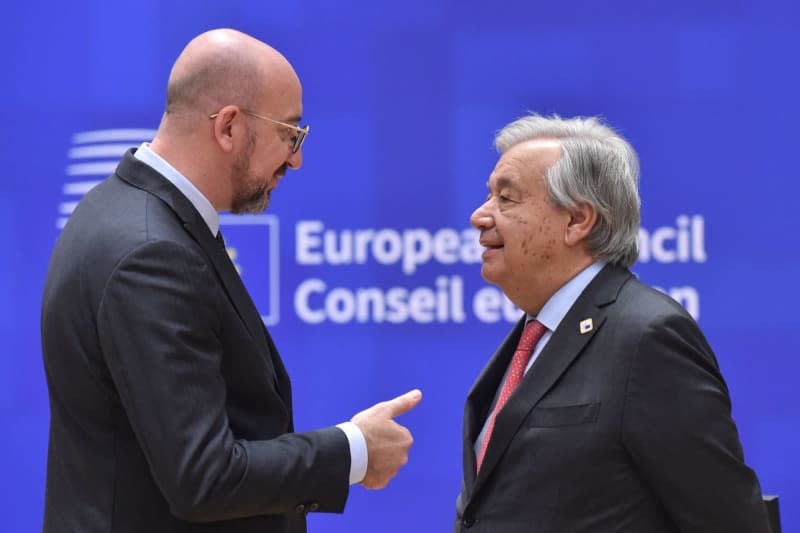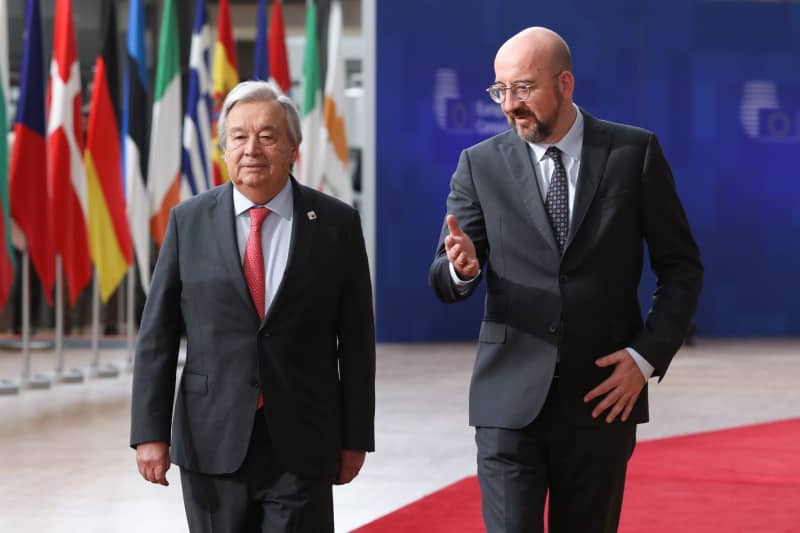EU leaders clear path for membership talks with Bosnia

- Oops!Something went wrong.Please try again later.
- Oops!Something went wrong.Please try again later.
- Oops!Something went wrong.Please try again later.
EU leaders on Thursday conditionally agreed to open formal talks with Bosnia-Herzegovina on joining the European Union, European Council President Charles Michel said on X, formerly known as Twitter.
The decision by prime ministers and presidents of the 27 EU countries means membership negotiations with Bosnia are officially open, but their unanimous agreement does not allow Brussels and Sarajevo to actually start talking just yet, diplomats told dpa.
Bosnia-Herzegovina will first need to demonstrate further progress on matters such as judicial reform and tackling corruption.
It will then fall to the European Commission to propose a plan for the talks - called a negotiating framework - which will need the unanimous approval of member states' EU affairs ministers.
EU leaders' declaration calls on the commission to prepare the framework for approval by member states "the moment all relevant steps" have been taken, according to a copy of the declaration posted to X by Michel's spokeswoman.
"It's a bit of a mixed message," explained Dutch Prime Minister Mark Rutte as he arrived at the EU summit in Brussels on Thursday, before the decision had been finalized. "Yes, we will support the commission proposal to open negotiations," he said. The commission proposed opening talks on March 12.
However, "before the negotiating framework can be agreed upon, it's crucial that Bosnia will fulfil all the necessary actions," Rutte said.
In a March 12 speech in Strasbourg announcing that the EU executive would recommend opening talks with Bosnia-Herzegovina, Commission President Ursula von der Leyen said: "Bosnia and Herzegovina has taken impressive steps forward. More progress has been achieved in just over a year than in a whole decade."
She added that the country had passed "important laws" on matters such as preventing conflicts of interest, money laundering and terrorist financing. Bosnia's management of migration "continues to improve," von der Leyen said.
She also lauded progress "on dialogue and reconciliation" over the 1992-1995 Bosnian War, and noted that "the Ministry of Justice has agreed to include in the domestic criminal records the judgements of the International Criminal Tribunal for the former Yugoslavia."
Bosnia and Kosovo are the only Western Balkan countries that have not yet entered into formal accession talks with the EU.
"We have shifted gear in our approach to the region. We have realised that this is not enough to just wait for the western Balkans to move closer to us," von der Leyen said on March 12.
"It is not enough to say that the door is open. We must also take responsibility and support their path towards our union in any possible way," she said.
"This is why we have opened accession negotiations with Albania and North Macedonia. And this is why we have committed to doing the same with Bosnia and Herzegovina."
The first Western Balkan country to join the EU, Slovenia, was one of 10 new members that acceded in 2004. Croatia joined in 2013.
The EU opened negotiations with Serbia and Montenegro in 2012, and with Albania and North Macedonia in 2022.
Kosovo applied to join the EU in 2022. However, five EU countries - Cyprus, Greece, Romania, Slovakia and Spain - do not recognize Kosovo, which declared independence from Serbia in 2008.
Outside the Western Balkans, Ukraine, Moldova, Georgia and Turkey are also official candidates for EU membership. In December, the EU decided to open accession talks with Ukraine and Moldova, and to grant formal candidate status to Georgia.
The commission proposed negotiating frameworks for Ukraine and Moldova on March 12, the same day it recommended opening talks with Bosnia-Herzegovina.
Turkey has been a candidate for EU membership since 1999 and accession talks opened in 2005, but have stalled due to concerns about authoritarianism under President Recep Tayyip Erdoğan.


